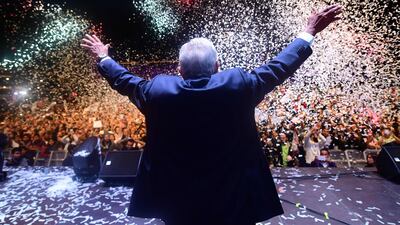Like his northern counterpart, Mexico's new president wrote a book before he was elected – and like his northern counterpart, too, that book could come to define his time in office.
Before Donald Trump's victory, his 1987 book, The Art of the Deal, on how to succeed in business was touted as a way to understand what to expect from a Trump presidency. Since his election, that book has been the subject of immense scrutiny and has become a prism through which his time in office is judged.
Last year, Andres Manuel Lopez Obrador – who was elected Mexican president on Sunday – wrote a book called Oye, Trump ("Listen Up, Trump") in which he called Mr Trump arrogant and attacked his views on Mexicans and immigration. He then went on a speaking tour of America with that same message.
Now, as he prepares for office, relations with Mr Trump may yet come to define his time in power.
No Mexican leader can escape the spectre of their northern neighbour. The US-Mexican relationship is so vital that not seeking to maintain it is almost politically unthinkable.
Even Mr Obrador, having railed against Mr Trump in print and on the campaign trail, said shortly after winning that he wanted "friendship" with the US, grounded in "mutual respect".
Mr Trump's response – via Twitter, saying “there is much to be done that will benefit both the US and Mexico” – could be read as an intention to focus on issues where they agree.
Yet even if both do indeed desire a friendship and hope to stick to matters of mutual agreement, they will not be able to avoid conflict. The political divide between them is simply too great.
Mr Obrador comes to power at a particularly combustible moment in US-Mexican relations.
Mr Trump has berated Mexico from the beginning of his candidacy, claiming in explosive language that its migrants are responsible for crime and sexual assault.
Immigration continues to be a huge source of contention for Americans on both sides of the political spectrum, while the US policy of separating children at the border from their migrant parents, which affected Mexican families, was hugely controversial around the world.
Mr Trump is also seeking a renegotiation of Nafta, the free trade agreement that includes Canada and Mexico.
And of course, looming over everything (although it has yet to loom over anything), is “The Wall”, the border barrier Mr Trump has been promising to build since he was a candidate and that he has repeatedly said Mexico will pay for.
So divisive is the issue that relations with the last Mexican president broke down over it; a state visit to Washington earlier this year for President Enrique Pena Nieto was cancelled after the demand for payment overshadowed the visit.
______________
Read more from Faisal Al Yafai:
The World Cup is at risk of becoming a substitute for ugly geopolitics
China and the US are the two elephants in the world and Europe risks being trampled
______________
On the face of it, however, Mexico's new president and Mr Trump should be able to get along. Both are charismatic populists who draw enormous crowds; both made chiding a distant political elite part of their appeal; and both represent a significant break with what has come before. Mr Obrador is the first left-wing president for decades.
Even politically, there is much to agree upon. Neither Mr Obrador nor Mr Trump want drug cartels operating across Mexican territory with impunity; the corruption that Mr Obrador has made a centre-piece of his political appeal also affects American firms; and if Mexico's economy could be improved, it would lead to a reduction in those seeking a better life on US territory.
Even on Nafta, a highly contentious issue and part of Mr Trump's fight with Canada's Justin Trudeau, there might be room to manoeuvre.
Mr Obrador has changed his position: once such a critic of the agreement that he called for it to be suspended, he moved on Monday to reassure businesses by saying he supported it and supported the team now negotiating it. Yet he will want a say in how that negotiation plays out, and while on the surface both he and Mr Trump believe the agreement is flawed, in practice both have demanded the agreement be more favourable to their own countries, setting up either a potential clash – or an unexpected alliance to end NAFTA.
In any case, Mexico has bigger problems than merely relations with the United States. It was a wave of political scandals, fury over corruption and rising crime that propelled Mr Obrador to the presidency. The president himself has called corruption Mexico's essential problem.
Any spats with the US will merely distract him from focusing on Mexico's very real issues – and it will be those issues that decide whether he is turfed out of office.
Yet the truth may be that regardless of what the presidents want, the political differences have a life of their own. It is possible that both sides will see the value in papering over their disagreements. But it is less likely their supporters will allow them to do so.
Both presidents, after all, have their own political bases to consider. Mexican populists hate the idea of being pushed around by their northern neighbour as much as American populists hate the idea of being taken advantage of by their southern neighbour. That desire not to be seen as weak by their respective bases may well define their relationship, especially as both presidents have used such uncompromising language already.
A left-wing populist Mexican president facing a right-wing populist American president at a time of real and serious political challenges is always going to create conflict. Even if both sides desire friendship, the politics will get in the way.


